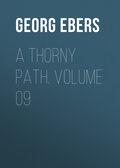
Georg Ebers
A Thorny Path. Volume 12
The greater number of the citizens, and at their head the wealthy and proud, still crowded the heathen temples to serve the old gods and purchase their favor with offerings; still, the Christian churches were too small and few to hold the faithful, and these had risen to higher consideration, for the community no longer consisted exclusively of the lower rank of people and slaves. No, men and women of the best families came streaming in, and this creed—as was proclaimed by Demetrius, the eloquent bishop; by Origen, who in power and learning—was the superior of any heathen philosopher; by the zealous Andreas, and many another chosen spirit—this creed was the religion of the future.
The freedman had never yet lived in such a happy and elevated frame of mind; as he looked back on his past existence he often remembered with thankful joy the promise that the last should be first, and that the lowly should be exalted. If the dead had risen from their graves before his eyes it would scarcely have surprised him, for in these latter days he had seen wonder follow on wonder. The utmost his soul had so fervently desired, for which he had prayed and longed, had found fulfillment in a way which far surpassed his hopes; and through what blood and fear had the Lord led His own, to let them reach the highest goal! He knew from the lady Euryale that his desire to win Melissa's soul to the true faith had been granted, and that she craved to be baptized. This had not been confirmed by the girl herself, for, attacked by a violent fever, she had during nine days hovered between life and death; and since then Andreas had for more than a week been detained in the town arranging affairs for Polybius.
The task was now ended which he had set himself to carry through. He could leave the city and see once more the young people he loved. He parted from Polybius and his sister at the garden gate, and led Heron and old Dido to a small cottage which his former master had given him to live in.
The gem-cutter was not to be allowed to see his children till the leech should give leave, and the unfortunate man could not get over his surprise and emotion at finding in his new home not only a work-table, with tools, wax, and stones, but several cages full of birds, and among these feathered friends a starling. His faithful and now freed slave, Argutis, had, by Polybius's orders, supplied everything needful; but the birds were a thought of the Christian girl Agatha. All this was a consolation in his grief, and when the gem-cutter was alone with old Dido he burst into sobs. The slave woman followed his example, but he stopped her with loud, harsh scolding. At first she was frightened; but then she exclaimed with delight from the very bottom of her faithful heart, "The gods be praised!" and from the moment when he could storm, she always declared, Heron's recovery began.
……………………
The sun was setting when Andreas made his way to Zeno's house—a long, white-washed building.
The road led through a palm-grove on the Christian's estate. His anxiety to see the beloved sufferers urged him forward so quickly that he presently overtook another man who was walking in the same direction in the cool of the evening. This was Ptolemaeus, the physician.
He greeted Andreas with cheerful kindness, and the freedman knew what he meant when, without waiting to be asked, he said:
"We are out of the wood now; the fever has passed away. The delirious fancies have left her, and since noon she has slept. When I quitted her an hour ago she was sleeping soundly and quietly. Till now the shaken soul has been living in a dream; but now that the fever has passed away, she will soon be herself again. As yet she has recognized no one; neither Agatha nor the lady Euryale; not even Diodoros, whom I allowed to look at her yesterday for a moment. We have taken her away from the large house in the garden, on account of the children, to the little villa opposite the place of worship. It is quiet there, and the air blows in on her through the open veranda. The Empress herself could not wish for a better sick-room. And the care Agatha takes of her! You are right to hasten. The last glimmer of sunshine is extinct, and divine service will soon begin. I am satisfied with Diodoros too; youth is a soil on which the physician reaps easy laurels. What will it not heal and strengthen! Only when the soul is so deeply shaken, as with Melissa and her brother, matters go more slowly, even with the young. However, as I said, we are past the crisis."
"God be praised!" said Andreas. "Such news makes me young again. I could run like a boy." They now entered the well-kept gardens which lay behind Zeno's house. Noble clumps of tall old trees rose above the green grass plots and splendid shrubs. Round a dancing fountain were carefully kept beds of beautiful flowers. The garden ended at a palm- grove, which cast its shade on Zeno's little private place of worship —an open plot inclosed by tamarisk hedges like walls. The little villa in which Melissa lay was in a bower of verdure, and the veranda with the wide door through which the bed of the sufferer had been carried in, stood open in the cool evening to the garden, the palm-grove, and the place of worship with its garland, as it were, of fragile tamarisk boughs.
Agatha was keeping watch by Melissa; but as the last of the figures, great and small, who could be seen moving across the garden, all in the same direction, disappeared behind the tamarisk screen, the young Christian looked lovingly down at her friend's pale and all too delicate face, touched her forehead lightly with her lips, and whispered to the sleeper, as though she could hear her voice:
"I am only going to pray for you and your brother."
And she went out.
A few moments later the brazen gong was heard—muffled out of regard for the sick—which announced the hour of prayer to the little congregation. It had sounded every evening without disturbing the sufferer, but to- night it roused her from her slumbers.
She looked about her in bewilderment and tried to rise, but she was too weak to lift herself. Terror, blood, Diodoros wounded, Andreas, the ass on which she had ridden that night, were the images which first crowded on her awakening spirit in bewildering confusion. She had heard that piercing ring of smitten brass in the Serapeum. Was she still there? Had she only dreamed of that night-ride with her wounded lover? Perhaps she had lost consciousness in the mystic chambers, and the clang of the gong had roused her.
And she shuddered. In her terror she dared not open her eyes for fear of seeing on all hands the hideous images on the walls and ceiling. Merciful gods! If her flight from the Serapeum and the rescue of Diodoros by Andreas had really been but a dream, then the door might open at any moment, and the Egyptian Zminis or his men might come in to drag her before that dreadful Caesar.
She had half recovered consciousness several times, and as these thoughts had come over her, her returning lucidity had vanished and a fresh attack of fever had shaken her. But this time her head seemed clearer; the cloud and humming had left her which had impeded the use of her ears and eyes.
Her brain too had recovered its faculties. As soon as she tried to think, her restored intelligence told her that if she were indeed still in the Serapeum and the door should open, the lady Euryale might come in to speak courage to her and take her in her motherly arms, and—And she suddenly recollected the promise which had come to her from the Scriptures of the Christians. It stood before her soul in perfect clearness that she had found a loving comforter in the Saviour; she remembered how gladly she had declared to the lady Euryale that the fullness of time had now indeed come to her, and that she had no more fervent wish than to become a fellow-believer with her kind friend— a baptized Christian. And all the while she felt as though light were spreading in her and around her, and the vision she had last seen when she lost consciousness rose again before her inward eye. Again she saw the Redeemer as He had stood before her at the end of her ride, stretching out His arms to her in the darkness, inviting her, who was weary and heavy laden, to be refreshed by him. A glow of thankfulness warmed her heart, and she closed her eyes once more.
But she did not sleep; and while she lay fully conscious, with her hands on her bosom as it rose and fell regularly with her deep breathing, thinking of the loving Teacher, of the Christians, and of all the glorious promises she had read in the Sermon on the Mount, and which were addressed to her too, she could fancy that her head rested on Euryale's shoulder, while she saw the form of the Saviour robed in light and beckoning to her.
Her whole frame was wrapped in pleasant languor. Just so had she felt once before-she remembered it well—and she remembered when it was. She had felt just as she did now after her lover had for the first time clasped her to his heart, when, as night came on, she had sat by his side on the marble bench, while the Christian procession passed. She had taken the chanting train for the wandering souls of the dead and—how strange! No—she was not mistaken. She heard at this moment the selfsame strain which they had then sung so joyfully, in spite of its solemn mode. She did know when it had begun, but again it filled her with a bitter-sweet sense of pity. Only it struck deeper now than before, for she knew now that it applied to all human beings, since they were all the children of the same kind Father, and her own brethren and sisters.
But whence did the wonderful music proceed—Was she—and a shock of alarm thrilled her at the thought—was she numbered with the dead? Had her heart ceased to beat when the Saviour had taken her in His arms after her ride through blood and darkness, when all had grown dim to her senses? Was she now in the abode of the blest?
Andreas had painted it as a glorious place; and yet she shuddered at the thought. But was not that foolish? If she were really dead, all terror and pain were at an end. She would see her mother once more; and whatever might happen to those she loved, she might perhaps be suffered to linger near them, as she had done on earth, and hope with assurance to meet them again here, sooner or later.
But no! Her heart was beating still; she could feel how strongly it throbbed. Then where was she?
There certainly had not been any such coverlet as this on her bed in the Serapeum, and the room there was much lower. She looked about her and succeeded in turning on her side toward the evening breeze which blew in on her, so pure and soft and sweet. She raised her delicate emaciated hand to her head and found that her thick hair was gone. Then she must have cut it off to disguise herself.
But where was she? Whither had she fled?
It mattered not. The Serapeum was far away, and she need no longer fear Zminis and his spies. Now for the first time she raised her eyes thankfully to Heaven, and next she looked about her; and while she gazed and let her eyes feed themselves full, a faint cry of delight escaped her lips. Before her, in the silvery light of the bright disk of the young moon lay a splendid blooming garden, and over the palms which towered above all else, in shadowy masses, in the distance the evening star was rising just in front, the moonlight twinkled and flashed in the rising and falling drops of the fountain; and as she lay, stirred to the depths of her soul by this silent splendor, thinking of kindly Selene moving on her peaceful path above, of Artemis hunting in the moonlight, of the nymphs of the waters, and the dryads just now perhaps stealing out of the great trees to dance with sportive fauns, the chant suddenly broke out again in solemn measure, and she heard, to deep manly voices, the beginning of the Psalm:
"Give thanks unto the Lord and declare his name; proclaim his wonders among the nations.
"Sing of him and praise him; tell of all his wonders; glorify his holy name; their hearts rejoice that seek the Lord."
Here the men ceased and the women began as though to confirm their praise of the most High, singing the ninetieth Psalm with enthusiastic joy:
"O Lord, thou hast been our dwelling-place in all generations.
"Before the mountains were brought forth, or, ever thou hadst formed the earth and the world, even from everlasting to everlasting, thou art God.
"For a thousand years in thy sight are but as yesterday when it is passed, and as a watch in the night."
Then the men's voices broke in again.
"The heavens declare the glory of God and the firmament showeth his handiwork.
"Day unto day uttereth speech, and night unto night showeth knowledge."
And the women in their turn took up the chant, and from their grateful breasts rose clear and strong the Psalm of David:
"Bless the Lord, O my soul, and all that is within me, bless his holy name.
"Bless the Lord, O my soul, and forget not all his benefits.
"Who forgiveth all thine iniquities; who healeth all thy diseases.
"Who redeemeth thy life from destruction; who crowneth thee with loving- kindness and tender mercies."
Melissa listened breathlessly to the singing, of which she could hear every word; and how gladly would she have mingled her voice with theirs in thanksgiving to the kind Father in heaven who was hers as well as theirs! There lay His wondrous works before her, and her heart echoed the verse:
"Who redeemeth thy life from destruction; who crowneth thee with loving- kindness and tender mercies," as though it were addressed especially to her and sung for her by the choir of women.
The gods of whom she had but just been thinking with pious remembrance appeared to her now as beautiful, merry, sportive children, as graceful creatures of her own kind, in comparison with the Almighty Creator and Ruler of the universe, whose works among the nations, whose holy name, whose wonders, greatness, and loving-kindness these songs of praise celebrated. The breath of His mouth dispersed the whole world of gods to whom she had been wont to pray, as the autumn wind scatters the many- tinted leaves of faded trees. She felt as though He embraced the garden before her with mighty and yet loving arms, and with it the whole world. She had loved the Olympian gods; but in this hour, for the first time, she felt true reverence for one God, and it made her proud to think that she might love this mighty Lord, this tender Father, and know that she was beloved by Him. Her heart beat faster and faster, and she felt as though, under the protection of this God, she need never more fear any danger.
As she looked out again at the palm-trees beyond the tamarisks, above whose plumy heads the evening star now rode in the azure blue of the night sky, the singing was taken up again after a pause; she heard once more the angelic greeting which had before struck her soul as so comforting and full of promise when she read it in the Gospel:
"Glory to God on high, on earth peace, good-will toward men."
That which she had then so fervently longed for had, she thought, come to pass. The peace, the rest for which she had yearned so miserably in the midst of terror and bloodshed, now filled her heart-all that surrounded her was so still and peaceful! A wonderful sense of home came over her, and with it the conviction that here she would certainly find those for whom she was longing.
Again she looked up to survey the scene, and she was now aware of a white figure coming toward her from the tamarisk hedge. This was Euryale. She had seen Agatha among the worshipers, and had quitted the congregation, fearing that the sick girl might wake and find no one near her who cared for her or loved her. She crossed the grass plot with a swift step. She had passed the fountain; her head came into the moonlight, and Melissa could see the dear, kind face. With glad excitement she called her by name, and as the matron entered the veranda she heard the convalescent's weak voice and hastened to her side. Lightly, as if joy had made her young again, she sank on her knees by the bed of the resuscitated girl to kiss her with motherly tenderness and press her head gently to her bosom. While Melissa asked a hundred questions the lady had to warn her to remain quiet, and at last to bid her to keep silence.
First of all Melissa wanted to know where she was. Then her lips overflowed with thankfulness and joy, and declarations that she felt as she was sure the souls in bliss must feel, when Euryale had told her in subdued tones that her father was living, that Diodoros and her brother had found a refuge in the house of Zeno, and that Andreas, Polybius, and all dear to them were quite recovered after those evil days. The town had long been rid of Caesar, and Zeno had consented to allow his daughter Agatha to marry Alexander.







